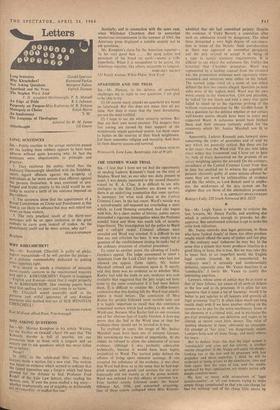THE STEPHEN WARD TRIAL
SIR,—I fear that I have not yet had the opportunity of reading Ludovic Kennedy's book on the trial of Stephen Ward but, as one who was daily present in court, I was deeply interested in the second thoughts voiced by R. A. Cline. It is difficult to see why analogies to the Star Chamber are drawn or why there is an underlying assumption that some apology is necessary for what took place at the Central Criminal Court. In the last resort. Ward's suicide was a melodramatic self-imposed act concluding a story which, as Lord Denning remarked, had also begun with him. As a sheer matter of history, public outcry demanded a rigorous investigation when the Profumo scandal burst and there was much talk of security imperilment. The investigation led the police to Ward and a call-girl racket. Criminal offences were revealed and Ward was arrested. It is difficult to see that any real criticism lies here. It was simply not a question of the establishment closing its ranks but of the ordinary processes of criminal procedure.
To come to another point, the allowing of Lucky Gordon's appeal. The judge announced in court a statement from the Lord Chief Justice who had just allowed the appeal. Quite rightly, Mr. Justice Marshall refused any discussion upon it. It merely said that there was no evidence as to whether Miss Keeler had told the truth or not; evidence was now available that suggested that the jury might not have come tp the same conclusion if it had been before them. It is difficult to criticise Mr. Griffith-Jones's contention that this finding left the Ward case exactly where it stood before. The conviction of Miss Keeler for perjury followed some months later and it is highly important to recall that this conviction concerned matters which had nothing to do with the Ward case. Because Miss Keeler lied on one occasion out of her obvious fear of Lucky Gordon, it does riot prove that she lied in the Ward case or that her evidence there should not be treated as it was.
To anybody in court, the image of Mr. Justice Marshall must have been one of extreme fairness. His summing-up was a model of impartiality. At the outset, he refused to allow the admission of certain evidence. although it was probably admissible technically, because it would have been highly prejudicial to Ward. The learned judge defined the offence of living upon immoral earnings. If one accepted the substance of the evidence. it was clear that Ward had done so in the sense that he had sup- plied women, with goods and services for use pro- fessionally and not merely as of the genus women. Ward was indicted for this offence at common law. Four further counts followed under the Sexual Offences Act, 1956, and concerned procuring. One of these counts collapsed when Miss Ricardo admitted that she had committed perjury. Despite the evidence of Vicky Barrett, a conviction after such an admission would be dangerous. The other three demanded a very high degree of corrobora- tion in terms of the Statute. Such corroboration as there was appeared as somewhat peripheral and the jury refused to accept it as being of a type to satisfy statutory requirements. It is difficult to see where the unfairness lies. Unlike the historical Star Chamber procedure, Ward was represented by a leading counsel from the criminal bar, the prosecution witnesses were rigorously cross- 'examined and witnesses were called on his behalf. The learned judge ruled on a point of law which defined the first two counts alleged. Speeches on both sides were of the highest level. Ward was his own worst enemy in the witness-box. Glib and plausible, he talked far too much and told a story tharquite failed to stand up to the rigorous probing of the brilliant cross-examination by Mr. Griffith-Jones. It was a question for the defence whether or not certain well-known names should have been in court and supported Ward. A subpoena would have fetched them and their absence certainly called for the comments which Mr. Justice Marshall saw fit to make.
Apparently, Ludovic Kennedy puts forward views concerning the order of procedure and of trial by jury which are generally critical. But these are far wider issues than the Ward trial. Yet any trial takes place within this framework and 1 have yet to hear th: hulk of trials denounced on the grounds of an unfair weighting against the accused. On the contrary, attendance at the Central Criminal Court from time to time has enabled me to witness the acquittal of persons obviously guilty of some serious offence be- cause they are saved by technicalities of evidence and the like whilst, as Lord Birkett used to empha- sise, the weaknesses of the jury system are far slighter than are those of the alternatives proposed.
F. H. AMPHLETT MICKLEWRIGHT Bishop's Folly, 228 South Norwood Hill, SE25






































 Previous page
Previous page